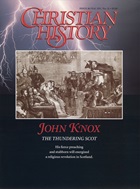In his opening statement in his disputation with the Abbot of Crosraguel, Knox had proudly contrasted the moral integrity of the Protestant ministers with the flagrant vice of the priests of the old church:
“If our lives shall be compared with the lives of them that accuseth us, be it in general or be it in particular, we doubt not to be justified, both before God and man. For how many ministers this day within Scotland is my Lord Abbot … able to convict to be adulterers, fornicators, drunkards, bloodshedders, oppressors of the poor widow, fatherless, or stranger … ?”
But before this statement was published in the verbatim report of the disputation, the case of Paul Methven had made a mockery of Knox’s words.
A Leader Falls
Methven had been elected as the minister of Jedburgh after the victory of 1560. This was an important position, because the Borders [a region bordering England] had not yet been converted, and Knox attached great importance, for political as well as religious reasons, to making the Borders Protestant. Methven, who more than any other man could be said to have started the revolution of 1559 with his passionate sermons in Dundee, seemed an eminently suitable person for the post.
But in the autumn of 1562, rumors began to circulate in Jedburgh that Methven was committing adultery with his young maidservant while his elderly wife was absent from home. When the rumors reached the General Assembly at Edinburgh during its meeting in December, the Assembly directed Knox to investigate the charge and to report to the church session of Edinburgh and to John Spottiswood, superintendent of Lothian. Knox traveled to Jedburgh with some elders of the church of Edinburgh, and on January 3, 1563, began hearing the case.
He admits, in his History, that he and his colleagues were very eager to find Methven not guilty, and “having a good opinion of the honesty and godliness of the man, travailed what they could (conscience not hurt) to purge him of the slander.”
When the evidence of eye-witnesses was becoming so strong that it would not be ignored, the maidservant’s brother suddenly arrived in Jedburgh. This man disclosed that his sister had recently had an illegitimate baby in his house, and that he knew that Methven was the father. When Methven saw the brother appear as a witness, he immediately left Jedburgh and disappeared.
Knox and the elders returned to Edinburgh to report that Methven was guilty. Spottiswood and the Edinburgh church session thereupon summoned Methven to appear to hear sentence passed against him, but he fled to England, and in his absence was deprived of his office as a minister, and excommunicated.
Integrity and Sadness
The action of Knox, in exposing the guilt of Methven, is a tribute to his integrity. He gave an honest judgment, although he must have realized the jubilation with which the Catholics and the enemies of the church would greet the verdict.
In his account of the upsurge of 1558–59, he did not try to minimize Methven’s part, describing how in 1558 “did God stir up his servant Paul Methven (his later fall ought not to deface the work of God in him).” Knox used the case of Methven to contrast the determination of the Protestant church to punish sin with the way in which the Catholic church had tolerated the immorality of so many bishops and abbots, and pointed out that the adultery of David and the abnegation of Peter had not vitiated the truth of the doctrine they had previously taught.
The Stool of Repentance
In 1566 Methven returned to Scotland and asked the forgiveness of the church. He was ordered to stand outside the church door and “sit on the stool of repentance” in Edinburgh, Jedburgh, and Dundee, after which he would be released from excommunication and readmitted as a member of the congregation.
He declared that the penalty was very harsh, but it was decided that despite the sincerity of his repentance, he could not be treated more leniently because of the position he had formerly held in the church.
He stood at the church door in Edinburgh, where he aroused great compassion among the congregation, and then did the same at Jedburgh. But he could not bring himself to do it in Dundee, where he had served the cause so well in 1558–59, and again fled to England.
He became the vicar of a parish in Somerset, and later held two other benefices in the county, where he served for forty years until his death in 1606.
Death for Adultery?
Methven was not the only minister who failed to maintain the high standard of sexual morality the church enforced upon the people.
Alexander Jarden, the minister of Kilspindie, committed fornication with a virgin and afterwards married her. In view of his repentance and subsequent marriage, he was forgiven by the church session. After being suspended for a time from his office as minister by the superintendent of Fife, he was readmitted next year by the General Assembly.
Fornication was a much less serious offense than adultery. When Robert Richardson, the Lord High Treasurer of Scotland, had an illegitimate child by an unmarried woman, he was forced to make public confession on the stool of repentance while Knox preached a sermon. But no further punishment was inflicted upon him.
But even with regard to adultery, the practice of the church was always less rigid than its theory. It was repeatedly demanded that the law of Scotland should be brought into conformity with the law of God by making adultery a capital offense. And Knox, in his History, protests against the mildness of the Act of Parliament of 1563 that imposed the death penalty for adultery only after a warning to desist from it had been given and ignored.
But in no case was the death sentence for adultery carried out in Scotland, and when Methven [had earlier written] from England to the General Assembly, he was given an official assurance that if he returned to Scotland to submit to the punishment of the church, he would be in no danger of being proceeded against under the statute of 1563.
Jasper Ridley is author of John Knox (Oxford, 1968), from which this article is excerpted with permission.
Copyright © 1995 by the author or Christianity Today/Christian History magazine.
Click here for reprint information on Christian History.

Support Our Work
Subscribe to CT for less than $4.25/month





























